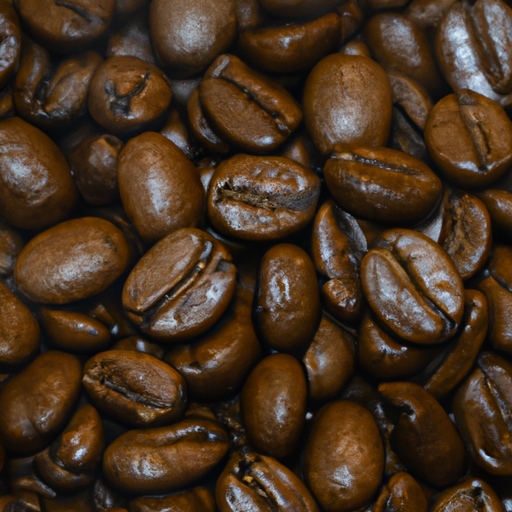In the world of coffee, the options for flavors, roasts, and origins seem endless. With so many choices available, it’s natural to wonder if you can use any coffee beans with your coffee maker. The answer is a resounding yes! Whether you prefer bold dark roasts, smooth medium roasts, or even flavored coffee beans, your coffee maker can handle it all. So go ahead and explore the wide variety of coffee beans out there, and let your coffee maker work its magic to brew you a delicious cup of joe every time. Whether it’s a Monday morning pick-me-up or a leisurely weekend treat, your coffee maker is ready to bring your favorite beans to life.
Types of Coffee Beans
Arabica Coffee Beans
Arabica coffee beans are the most popular and widely consumed coffee beans in the world. Known for their delicate and refined flavors, Arabica beans are grown at higher altitudes in regions with a mild climate. These beans have a smooth and fruity taste, often with hints of chocolate, caramel, or floral notes. Arabica beans generally have a lower caffeine content compared to other types of coffee beans.
Robusta Coffee Beans
Robusta coffee beans are known for their strong and bold flavors. These beans are grown in lower altitudes and are more resistant to pests and diseases, making them ideal for cultivation in regions with harsher climates. Robusta beans have a higher caffeine content and are often described as having a more bitter taste. They are commonly used in espresso blends to add body and crema to the final cup.
Blend of Arabica and Robusta Coffee Beans
Blends of Arabica and Robusta coffee beans are widely available in the market and offer a combination of the best qualities from both types of beans. These blends can be tailored to suit different taste preferences and can offer a balance between the fruity notes of Arabica and the robustness of Robusta. Whether you prefer a milder or stronger flavor profile, a blend of Arabica and Robusta beans can cater to your taste.
Grind Size
Coarse Grind
A coarse grind is characterized by larger coffee grounds that resemble sea salt or breadcrumbs. This grind size is commonly used for brewing methods that require longer steeping or brewing times, such as French press or cold brew. The larger surface area of the coarser grounds allows for a slower extraction process, resulting in a fuller-bodied and less bitter cup of coffee.
Medium Grind
A medium grind is the most commonly used grind size for drip coffee makers. It has a texture that is similar to granulated sugar. This grind size allows for a balance between the extraction of flavors and the brewing time. It is suitable for methods like pour-over brewers and drip coffee makers, as it allows water to flow evenly through the grounds and extract the desirable flavors.
Fine Grind
A fine grind has a texture similar to table salt or sand. It is commonly used for espresso machines and moka pots, which require a shorter brewing time. The finer grind allows for a faster extraction process and a more concentrated and intense flavor profile. It is important to note that using a fine grind in a regular drip coffee maker may lead to over-extraction and a bitter taste.
Extra Fine Grind
An extra fine grind is even finer than a fine grind and has the consistency of powdered sugar. This grind size is typically used for Turkish coffee or Vietnamese-style drip coffee, where the coffee is brewed directly in water without any separate filtering mechanism. The extra fine grind allows for a strong and concentrated flavor extraction in these brewing methods.
Roast Level
Light Roast
A light roast is characterized by its light brown color and a milder flavor profile. These beans are roasted for a shorter duration at lower temperatures, allowing the natural flavors and acidity of the beans to shine through. Light roast coffee beans often exhibit fruity and floral notes with a higher level of acidity. They are perfect for those who prefer a brighter and more delicate cup of coffee.
Medium Roast
A medium roast is the most common roast level and is often referred to as the “American roast.” It has a medium brown color and a balanced flavor profile. Medium roast coffee beans have slightly less acidity compared to light roast beans, with flavors that are a combination of sweetness, acidity, and body. This roast level is versatile and suitable for most coffee brewing methods.
Medium-Dark Roast
A medium-dark roast is darker in color, leaning towards a deeper shade of brown. The beans are roasted for a longer duration, which results in a fuller body and a richer flavor profile. Medium-dark roast coffee beans have a slightly sweeter taste with reduced acidity. They are often preferred by those who enjoy a stronger and more pronounced flavor in their coffee.
Dark Roast
Dark roast beans have a dark brown, almost-black color and a bold flavor profile. The longer roasting process imparts a smoky and caramelized taste to the beans, with significantly reduced acidity. Dark roast coffee beans are often associated with flavors like chocolate, toasted nuts, and spices. They are commonly used for espresso blends and are favored by those who enjoy a robust and intense cup of coffee.
French Roast
French roast is the darkest and boldest roast level, characterized by its shiny and oily appearance. These beans are roasted to a high temperature, resulting in a strong and smoky flavor profile. French roast coffee beans have a rich and complex taste, often with notes of dark chocolate, charred wood, and an intense bitterness. They are commonly used in espresso preparations and are best suited for those who prefer a deep and powerful coffee experience.
Italian Roast
Italian roast is similar to French roast in terms of darkness and intensity. These beans are roasted until they reach the brink of being burnt, resulting in an extremely dark and oily surface. Italian roast coffee beans have a strong and bitter taste, with flavors that are reminiscent of dark chocolate and burnt caramel. This roast level is commonly used in Italian-style espresso preparations and is favored by those who enjoy a bold and robust cup of coffee.
Freshness of the Beans
Roasted On Date
The freshness of coffee beans plays a crucial role in the quality of the final cup. It is generally recommended to consume coffee beans within two to four weeks of the roast date for optimal flavor. Coffee beans have their peak flavor during this period, as they have not yet started to lose their natural oils and aromas. Look for coffee beans that have a clearly marked roasted on date to ensure you’re getting the freshest possible beans.
Expiration Date
While coffee beans technically do not expire, they start to lose their freshness and flavor over time. Coffee beans that are past their expiration date may taste stale and lack the complexity and depth of flavor that fresh beans offer. It is best to consume coffee beans well before their expiration date to experience the true taste and aroma of the coffee.
Whole Beans vs Ground Coffee
Whole beans retain their freshness and flavor for a longer period compared to pre-ground coffee. When coffee beans are ground, they are exposed to oxygen, leading to a quicker loss of aroma and flavor. Grinding coffee beans just before brewing ensures a fresher and more flavorful cup. However, if convenience is a priority, pre-ground coffee can be a suitable option as long as it is stored in an airtight container and consumed within a shorter timeframe.
Compatibility with Different Coffee Makers
Drip Coffee Maker
Drip coffee makers are one of the most popular home brewing methods. They require a medium grind size and are compatible with a wide range of coffee beans. Whether you prefer a light, medium, or dark roast, you can adjust the grind size accordingly to achieve the desired strength and flavor in your cup of drip coffee.
Pour-Over Brewer
Pour-over brewers, such as the V60 or Chemex, offer a more hands-on brewing experience. They work best with a medium grind size, allowing for a balanced extraction and a clean cup of coffee. Different coffee beans, from light to dark roasts, can be used with pour-over brewers to create a customized flavor profile.
French Press
French press brewing requires a coarse grind size to avoid sediment in the final cup. This brewing method is best suited for medium to dark roast coffee beans, as the longer steeping time enhances the richness and body of the coffee. The oils and flavors of the coffee beans are preserved in the full immersion process of the French press.
Espresso Machine
Espresso machines require a fine grind size to achieve the proper extraction within a short amount of time. Espresso roast beans, which are specifically roasted for espresso brewing, are the ideal choice for espresso machines. These beans are often dark roasted and have a rich and robust flavor profile that can withstand the high pressure and fast extraction process of espresso brewing.
Single-Serve Coffee Maker
Single-serve coffee makers, such as pod or capsule machines, offer convenience and simplicity. These machines are designed to work with specific coffee pods or capsules provided by the manufacturer. While the variety of coffee beans may be limited in this format, it ensures consistency and eliminates the need for grinding and measuring coffee.
Flavor Profiles
Fruity and Bright
Fruity and bright flavor profiles are often found in light roast coffee beans, particularly those with citrusy or berry-like notes. These coffees are vibrant and refreshing, with a pleasant acidity that adds a lively and tangy characteristic to the brew. They are perfect for those who enjoy a refreshing and fruit-forward cup of coffee.
Floral and Delicate
Floral and delicate flavor profiles are commonly associated with coffee beans that have floral or tea-like aromas. These beans often exhibit subtle flavors of jasmine, lavender, or chamomile. The delicate nature of these flavor profiles makes them ideal for those who prefer a more nuanced and aromatic cup of coffee.
Nutty and Chocolatey
Nutty and chocolatey flavor profiles are often found in medium to dark roast coffee beans. These beans have a richer and more pronounced taste, with notes of roasted nuts, cocoa, or caramel. The nutty and chocolatey flavors provide a comforting and indulgent experience, making them a popular choice for those who enjoy a full-bodied and satisfying cup of coffee.
Earthy and Spicy
Earthy and spicy flavor profiles are characteristic of coffee beans with a darker roast, imparting flavors that are reminiscent of earth, wood, or spices like cinnamon or clove. These beans have a bold and robust taste, with a lingering finish. The earthy and spicy flavors add complexity and depth to the brew, making it a favorite among those who appreciate a strong and flavorful cup of coffee.
Bitter and Bold
Bitter and bold flavor profiles are often associated with espresso roast coffee beans or dark roast beans. These beans have a pronounced bitterness and a robust taste. The bold and bitter flavors create a strong and powerful cup of coffee, perfect for those who enjoy a bold and intense flavor experience.
Convenience and Maintenance
Ease of Cleaning
When choosing coffee beans, it is important to consider the ease of cleaning associated with different brewing methods. For example, brewing methods like drip coffee makers or pour-over brewers typically have removable parts that can be easily cleaned. On the other hand, French presses may require more thorough cleaning due to the filters and the need to dispose of the coffee grounds.
Clogging Potential
Certain coffee beans or grind sizes may be more prone to clogging in specific coffee makers. For example, fine or extra fine grind sizes can lead to clogging in drip coffee makers or pour-over brewers if not properly filtered. It is important to match the grind size with the brewing method to minimize the risk of clogging and ensure smooth and consistent brewing.
Compatibility with Filters
Different brewing methods require specific types of filters, such as paper filters or metal mesh filters. Some coffee beans or grind sizes may work better with certain types of filters, which can affect the overall taste and clarity of the final cup. It is important to consider the compatibility between coffee beans, grind size, and filters to optimize the brewing process and achieve the desired taste.
Specialty Coffee Beans
Single Origin Coffee
Single-origin coffee refers to beans that are sourced from a specific region or even a specific farm. These beans showcase the unique flavors and characteristics of their origin, allowing for a more focused and distinct coffee drinking experience. Single-origin coffees often have a story behind them, highlighting the terroir and the craftsmanship involved in their production.
Fair Trade Coffee
Fair trade coffee ensures that the farmers who grow the coffee beans receive fair compensation for their labor. The fair trade certification guarantees that the coffee is produced and traded under ethical standards. Choosing fair trade coffee allows for the support of sustainable and equitable farming practices, making it a socially responsible choice.
Organic Coffee
Organic coffee is produced without the use of synthetic chemicals or pesticides. These beans are grown using organic farming methods that prioritize environmental sustainability and the preservation of soil health. Organic coffee is ideal for those who prioritize consuming products that are free from harmful chemicals and promote a more sustainable approach to farming.
Flavored Coffee
Flavored coffee beans have been infused with additional flavors to create a unique and distinct taste. These flavors can range from classics like vanilla or caramel to more adventurous options like hazelnut or cinnamon. Flavored coffee beans can add a fun and flavorful twist to your daily brew, allowing for a more customized and personalized coffee experience.
Ethically Sourced Coffee
Ethically sourced coffee ensures that the beans have been produced and traded under fair and sustainable practices. This can involve supporting farmers who are part of cooperatives or initiatives that promote social and economic development in coffee-producing regions. Ethically sourced coffee allows consumers to enjoy their cup of coffee knowing that it has been produced in a responsible and ethical manner.
Personal Preference
Experimentation
One of the joys of coffee brewing is the ability to experiment and explore different flavors, aromas, and brewing techniques. Don’t be afraid to try different types of coffee beans and adjust brewing variables to find your preferred taste. Whether it’s trying a new roast level, exploring different origins, or experimenting with brew ratios, embracing experimentation can lead to exciting coffee discoveries.
Taste Preferences
Everyone’s taste preferences are different when it comes to coffee. Some prefer a more balanced and mild flavor, while others enjoy a stronger and bolder cup. Consider your personal taste preferences when selecting coffee beans. If you enjoy a fruity and bright cup, opt for light roast beans. If you prefer a richer and more intense flavor, try a dark roast or an espresso blend. Choosing coffee beans that align with your taste preferences ensures a more enjoyable coffee experience.
Aroma Preferences
The aroma of coffee plays a significant role in the overall sensory experience. Different coffee beans can have distinct aroma characteristics, ranging from floral and citrusy to earthy and nutty. Consider the aroma preferences that appeal to you when selecting coffee beans. A coffee with a pleasing and enticing aroma can enhance the enjoyment of the brewing process and create a more satisfying cup.
Caffeine Content
Caffeine content can vary significantly among different types of coffee beans. If you prefer a milder and less stimulating cup, opt for beans with a lower caffeine content, such as Arabica beans. On the other hand, if you enjoy a stronger and more energizing brew, Robusta beans or espresso blends can offer a higher caffeine content. Consider your caffeine sensitivity and desired level of stimulation when choosing coffee beans.
Considerations for Espresso
Espresso Roast Beans
Espresso roast beans are specifically roasted to withstand the high-pressure extraction process of espresso brewing. These beans are often dark roasted to bring out the desired flavors and oils necessary for a rich and intense espresso shot. Espresso roast beans provide a balanced and robust flavor profile that can stand up to milk-based drinks or be enjoyed on their own.
Fine and Consistent Grind
Espresso brewing requires a fine and consistent grind to ensure proper extraction and the creation of a creamy and flavorful shot. The fine grind allows for more surface area to come into contact with water, resulting in a concentrated and intense flavor. Consistency in grind size is also crucial to ensure even extraction and prevent under-extraction or over-extraction.
Suitable for Pressure Extraction
Espresso brewing involves the use of high-pressure extraction to create a concentrated shot of coffee. Not all coffee beans are suitable for this brewing method, as some may lack the necessary density and composition to withstand the pressure. Espresso roast beans, which are specifically selected and roasted for espresso brewing, are the most suitable choice for achieving the desired espresso extraction and flavor.
In conclusion, selecting the right coffee beans for your coffee maker involves considering various factors such as bean type, grind size, roast level, freshness, compatibility with your specific brewing method, flavor profiles, convenience, and personal preferences. By understanding these elements, you can enhance your coffee brewing experience and enjoy a cup of coffee that suits your taste preferences and desired flavor profile. Remember to explore and experiment with different options to discover your perfect cup of coffee. Happy brewing!




